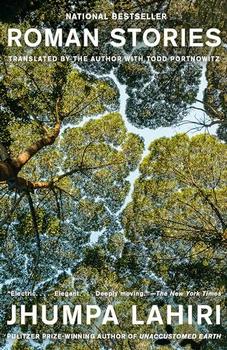Summary | Excerpt | Reviews | Beyond the book | Read-Alikes | Genres & Themes | Author Bio

Jhumpa Lahiri returns to her trademark character-driven short stories with the collection Roman Stories, originally written in her adopted language of Italian. In a series of nine stories, divided into three parts, she narrates the lives of Roman denizens. Perhaps informed by her own experience living in Rome, she often takes the perspective of the outsider: immigrant, expatriate, tourist. Through their eyes and their lives, she paints a picture of a city that "is shit…but so damn beautiful." In addition to newcomers, who in their own countries "knew how to run [their lives…but] these days, in this country…can barely manage a thing," she sometimes inhabits lifelong Romans, for whom "going to a new pharmacy, buying the newspaper from a different newsstand, finding a table at a different coffee bar – was the equivalent of departure, displacement, complete rupture."
"The Steps," appearing in the middle of the collection, is presented as a succession of unlinked vignettes, sketching the lives of people who use a set of steps that connects two neighborhoods and showing all the social variations amongst them. Lahiri explores how these lives interact and, at times, clash. In stories like "The Delivery" and the vignette "The Girl" from "The Steps," she probes the complex grief, hope, and jealousy of immigrant parents watching their children become part of Italian culture in a way they never can be, a through line from her prior work tracing the Westernization of Bengali families in New England.
Lahiri is a keen observer of people's lives. Her storytelling narrates existences characterized by the little details and daily burdens each of us bears. In "The Notes," a former housewife, driven by nostalgia, takes a job as a school monitor at her now-adult children's former school. But instead of encountering a repast of memories, she finds herself the target of mean-spirited notes, written in child-like script and slipped in her raincoat pocket.
In sharing Lahiri's characters' thoughts, we can recognize parts of ourselves in them. At the same time, her use of rich details contributes to the scene, even when these details aren't the focus of her story. In "P's Parties," about a mostly imagined love triangle dreamed up by a husband at a friend's party, vacation plans and bungalows by the sea evoke a picture of summer and the tradition of Ferragosto, a holiday for which Italians debunk to the beach or the mountains, creating a lovely setting for a story about possible budding infidelity to unfold. It is through the ingenuity of setting and character development together that Lahiri builds a sense of place and the feeling of being in Rome.
The prose is haunting, lyrical, and rich with meaning. In the closing story, "Dante Alighieri," a woman reflects on love and life through the lens of the famous poet. "For years," Lahiri writes at one point, "nearly every Sunday, [she] used to have lunch with the woman lying in the coffin." What a powerful way of describing the death of someone familiar. Lahiri's earlier work reads differently, perhaps plainer and more straightforward; this change in style may be the development of her narrative voice or a byproduct of the mechanics of the translated Italian.
Though the stories are brief, the trajectories of the characters are dynamic. In classic Roman epic style, each of their fortunes changes abruptly. Those happy at the outset find themselves hurt, humiliated, and defeated, while those grieving end up surrounded by love and condolence. These startling changes are perhaps one more thing we can find to relate to in their lives.
![]() This review
first ran in the November 1, 2023
issue of BookBrowse Recommends.
This review
first ran in the November 1, 2023
issue of BookBrowse Recommends.

If you liked Roman Stories, try these:

by Andre Aciman
Published 2025
Three hypnotic novellas about obsessional love, missed connections, and enduring regret by the bestselling author of Call Me by Your Name.

by Jo Piazza
Published 2025
From bestselling author and award-winning journalist Jo Piazza, comes a transporting novel rooted in the author's own family history about a long-awaited trip to Sicily, a disputed inheritance, and a family secret that some will kill to protect ...
Your guide toexceptional books
BookBrowse seeks out and recommends the best in contemporary fiction and nonfiction—books that not only engage and entertain but also deepen our understanding of ourselves and the world around us.